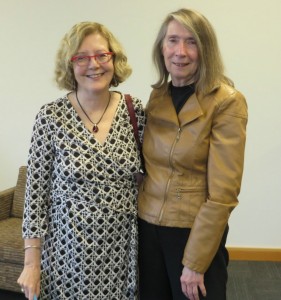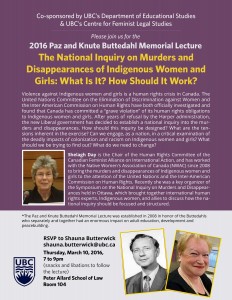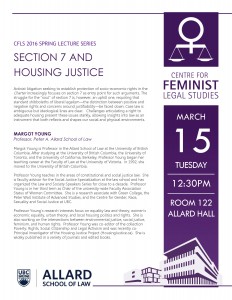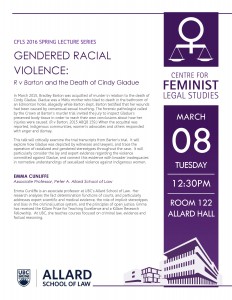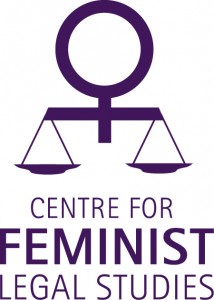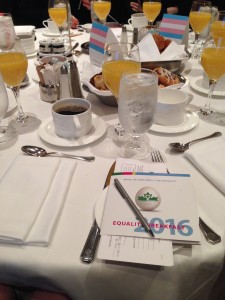
By Professor Emerita Susan Boyd
Several members of the CFLS and Allard School of Law attended West Coast LEAF’s 2016 Equality Breakfast early on March 11th, including several at the Dean’s table. This breakfast is a great opportunity to celebrate women’s equality and to think about working together for equality. It’s also a chance for students, faculty and staff to meet up with Allard Law alumni, many of whom are involved in West Coast LEAF’s work. Of special note this year, the new Women’s Legal Clinic (a collaboration between Allard School of Law and West Coast LEAF) was proudly announced.
This year’s invited speakers were Michele Landsberg, renowned Canadian feminist journalist, and her daughter Ilana Landsberg-Lewis, a labour and human rights lawyer who is now Executive Director of the Stephen Lewis Foundation, which works on HIV/AIDS in Africa. The lively inter-generational conversation between Michele and Ilana was facilitated by Erica Johnson, a reporter for Go Public and EMCEE for the 2016 Equality Breakfast.
Michele and Ilana provided a passionate “reality check” for those who think or hope that having a Prime Minister who calls himself a feminist and who plans to put a woman on our currency is sufficient cause for celebration. They emphasized the urgency of holding the government accountable and pushing it to deal with the many difficult complex issues confronting women today, including the fact that public childcare is crucial and has still not been offered. These women were not afraid to use the word ‘socialist’ and to name capitalism as a key source of the systemic inequalities facing women that must be challenged. They also noted the disparagement of trade unions that has occurred and linked their demise to women’s economic inequality. Ilana spoke to the global crises facing young women, including climate change and economic inequalities. She applauded the ways in which young feminists and social justice activists fight across a range of issues and take the interaction of systems of oppression into account in their work.
Asked about the Ghomeshi trial, both women were sharply critical of a legal system where it seems that women complainants appear to be on trial rather than the accused man. While being pessimistic about the ability of the criminal justice system to deal with rape, Michele and Ilana were also inspired by the public conversation about sexual assault that has occurred. Michele noted that so many things have changed during her lifetime for the better, and this intelligent public discourse on rape is an example.
The conversation ended on a theme of the importance of finding ways to work across differences amongst feminists. Michele and Ilana emphasized that we cannot afford divisions any longer because the stakes are so high. Although debate and disagreement within feminist groups is healthy and inevitable, it needs to be conducted respectfully and in a manner that keeps lines of cooperation open. Michele spoke to the need for a national women’s organization. Finally, both women underlined the importance of more women being in leadership positions and the responsibilities that come with such positions, including the need to consult with the communities that are involved in the issues being tackled, such as the inquiry into Murdered and Missing Indigenous Women.
Overall, we came away with a sense that much has been achieved but so much remains to be done. The need for feminist approaches remains clear, as does the need for feminists to raise children with feminist values and a commitment to social justice. Both Michele and Ilana are doing precisely that.

